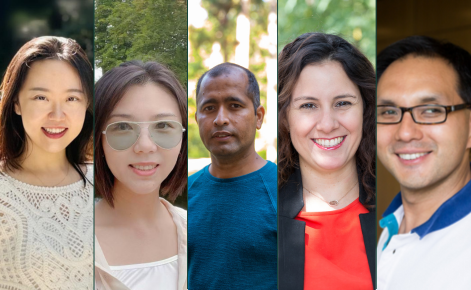Five Michigan State University scholars are featured in a special issue of the International Multilingual Research Journal focused on advancing multilingual education. Co-edited by Instructor Laxmi Prasad Ojha and Professor Peter De Costa, the issue addresses the ways to prepare pre-service teachers to effectively support multilingual learners in increasingly diverse classrooms.
In the U.S. alone, 5.5 million K-12 students are classified as English language learners, many of whom are immigrants or children of immigrants. According to Ojha, “Language plays a central role in teaching and learning processes, and teachers must be prepared to navigate the complexities of linguistically diverse classrooms.”

With multilingual students now comprising a significant proportion of classrooms worldwide, the research emphasizes the urgency of rethinking and enhancing teacher education programs. In their introductory piece, Ojha and De Costa emphasize the need for collaborative partnerships between university-based teacher education programs and local schools and communities. They urge educational researchers and teacher educators to take on active roles as change agents to support the education of multilingual learners.
“We recognized the growing number of multilingual students in classrooms and the need for teacher education programs to adapt to these changing demographics,” said Ojha, lead editor of issue.
Global collaboration
The special issue originated from a colloquium presented at the 2024 American Association of Applied Linguistics Conference. It includes five research articles, including one co-authored by Assistant Professor Lucia Cardenas Curiel and Instructors Ojha, Luqing Zang and Meiheng Chen from the Department of Teacher Education. Other contributions come from institutions such as the University of Colorado Boulder, University of Toronto, McGill University, University of Toronto, Concordia University, University of Maryland and the University of Edinburgh.
The special issue features topics such as teacher agency, critical multilingual language awareness (CMLA) and translanguaging—teaching approaches that create opportunities for multilingual students to draw from their full linguistic repertoires.
Impact of fieldwork
One of the featured studies co-authored by MSU scholars focuses on the transformative impact of a linguistic community walk project. The paper reports how this fieldwork assignment engaged pre-service teachers in exploring the linguistic and cultural landscapes of the local communities where they were placed for their student-teaching. The students identified gaps in resources for multilingual students, reflected on the challenges faced by linguistically and culturally diverse populations and envisioned pedagogical strategies that they could use to support these students in their classrooms.
The project encouraged students to analyze the power dynamics and inequities embedded in community language use. According to the research, many pre-service teachers observed the dominance of English and the lack of multilingual resources in public spaces such as libraries, government offices and grocery stores.
“This experience helped our students understand the systemic barriers faced by multilingual and recently arrived families,” explained Ojha. “Students began to see the value of incorporating students’ cultural and linguistic assets into their teaching practices.” Participants also recognized their own linguistic privilege and developed a deeper appreciation for multilingualism.
The contributors hope their research inspires changes in teacher education programs. “Every teacher, regardless of their discipline, should be equipped to support linguistically diverse students,” Ojha said.